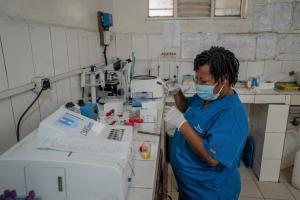Decentralizing testing for rapid mpox detection in the Democratic Republic of the Congo
Kinshasa – To ensure adequate and prompt detection of mpox cases, the Democratic Republic of the Congo is decentralizing laboratory services and accelerating efforts to curb the disease through close coordination with support from partners, including World Health Organization (WHO), who are providing critical diagnostic equipment and supplies to bolster the outbreak response.
In August 2024, eight additional laboratories were set up to test mpox samples in five provinces, targeting eight localities (Mbandaka, Ingende, Goma, Bukavu, Kamituga, Kisangani, Boende and Kinshasa).
“Strengthening diagnosis makes it possible to monitor transmission and geographical spread, as well as to track the evolution of disease transmission,” says Dr Olga Ntumba, laboratory focal point with WHO in the Democratic Republic of the Congo.
Delayed diagnosis has ripple effects on other key outbreak response measures including case confirmation, clinical care, follow-up and monitoring of contacts, as well as providing critical information to the health authorities at the national level for strategic decision-making.
With funding from the United States Agency for International Development (USAID), WHO delivered 3500 GeneXpert cartridges in September 2024 to support mpox diagnosis in the decentralized laboratories. The Organization also supplied 14 000 dry swabs and viral transport media to ensure quality sampling in all provinces. A further shipment of 12 000 GeneXpert cartridges is planned.
The ongoing efforts are helping to scale up laboratory testing. For example, the number of samples analysed rose from around 9700 on 8 September 2024 to over 11 400 on 17 September 2024. Reliable diagnosis is also helping to ensure rapid confirmation of cases, monitoring of the outbreak trend, as well as determining the areas of greatest infection burden to mobilize human and material resources for stronger response.
“The benefits of decentralized laboratories are improved access to diagnostics, reduced sample processing times and increased capacity for rapid response to outbreaks such as the current mpox outbreak,” says Dr Nicole Kumbolani Afuwa, Head of the Equateur Provincial Health Division.
For Brigitte Elema Tondoko, the supervisor of the mpox treatment centre at Wangata General Referral Hospital in Mbandaka province, swift and effective testing is crucial in halting the mpox outbreak.
“With the support of WHO, we have gradually improved our capacity to diagnose and detect mpox in the community,” says Tondoko. “We rely on the work of emergency teams to monitor cases, and we use the medicines and medical supplies we receive to treat the sick and protect frontline health workers. All this enables us to take better care of mpox patients, and we remain hopeful of containing this disease in the very near future.”
The spread of the mpox virus in Democratic Republic of the Congo is attributed to two distinct outbreaks: spread of mpox clade Ia in Equateur and other provinces of the country where mpox is endemic, and of clade Ib in North and South Kivu province, with a few cases in the capital Kinshasa.
The Democratic Republic of the Congo accounts for 90% of all mpox cases recorded in the African region, with over 30 000 suspected cases and 988 deaths reported as of 26 September 2024. WHO is supporting the country in implementing the national preparedness and response plan, including strengthening surveillance and diagnostic capacities, contact tracing, providing essential drugs for management, supplying equipment for infection prevention and control, vaccine rollout, risk communication and community engagement, and combating misinformation.
Communications and marketing officer
Tel: + 242 06 520 65 65 (WhatsApp)
Email: boakyeagyemangc [at] who.int (boakyeagyemangc[at]who[dot]int)
Chargée de communication
Tél : +243 899 330 358
Email: dimegnim [at] who.int (dimegnim[at]who[dot]int)
